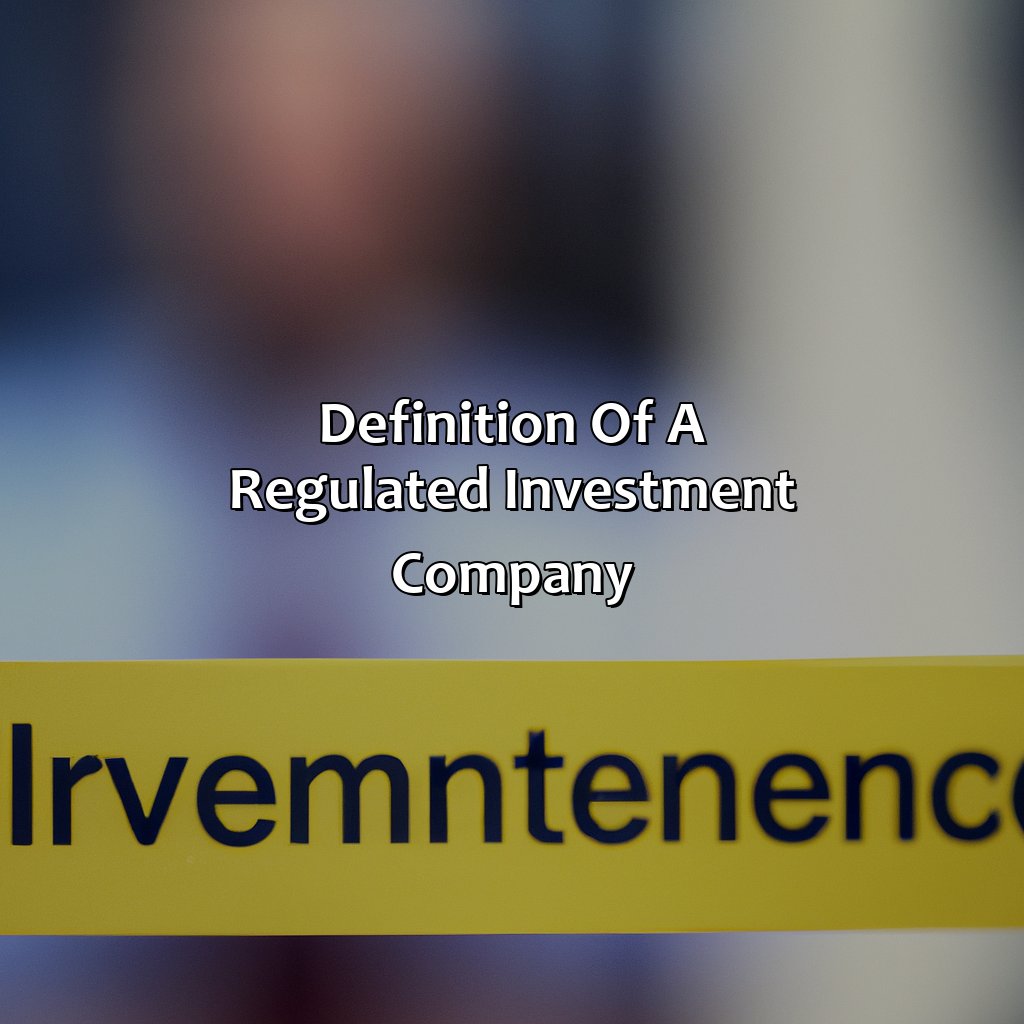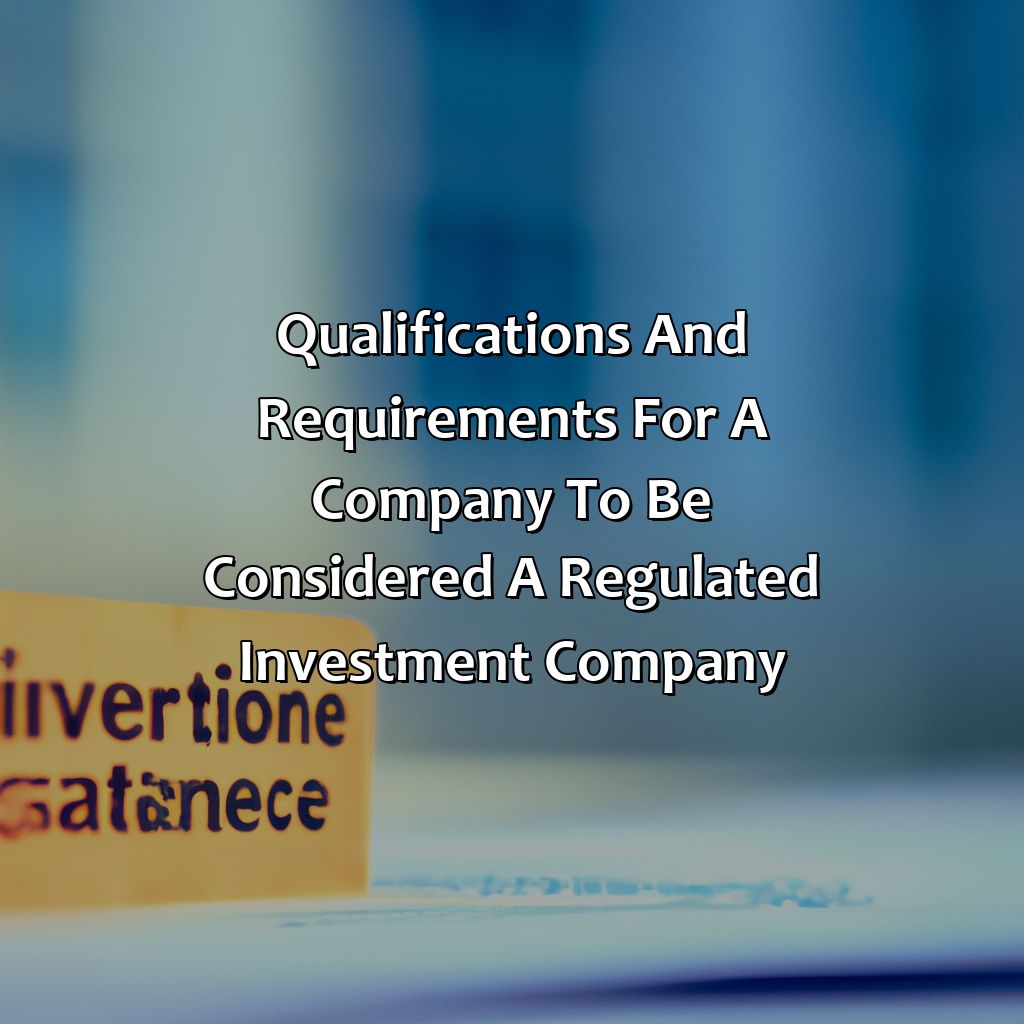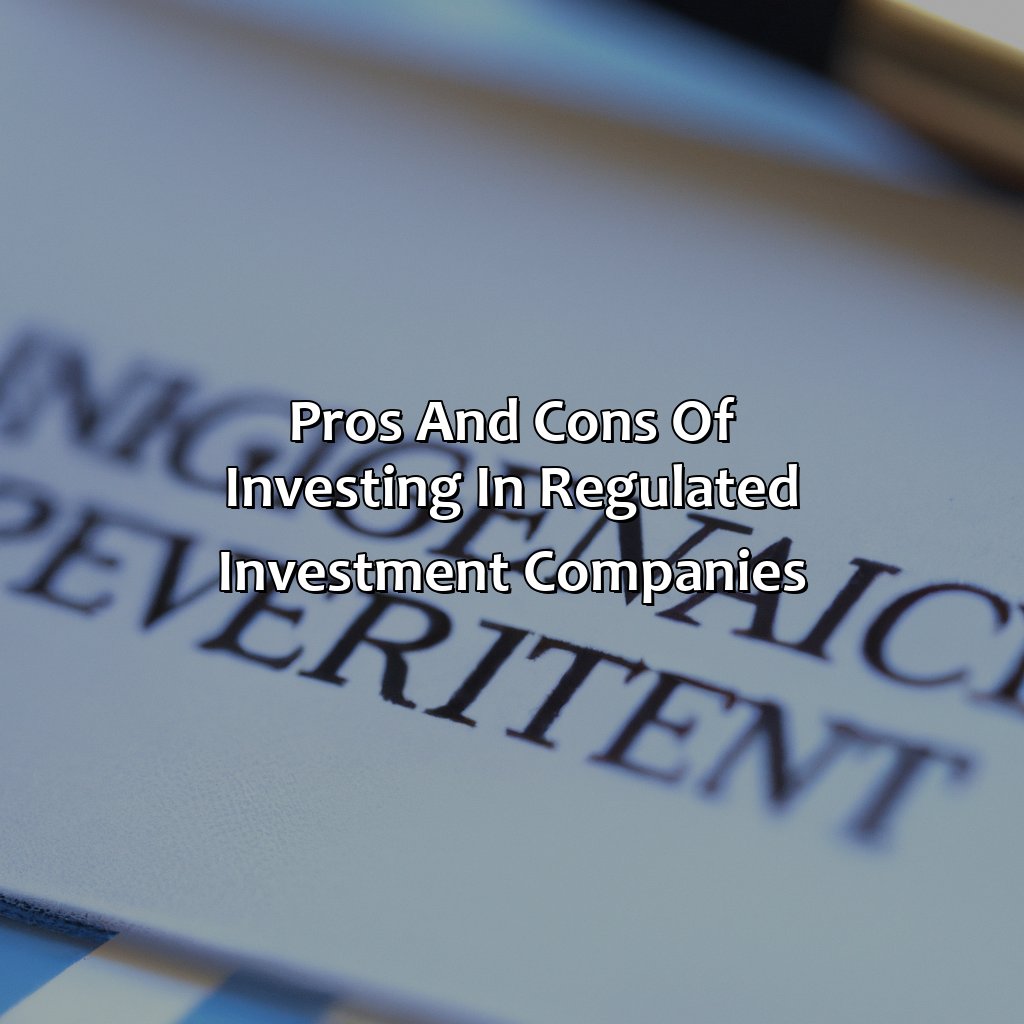What Is A Regulated Investment Company?
Key Takeaway:
- A Regulated Investment Company (RIC) is a type of investment company that is regulated by the Securities and Exchange Commission (SEC) and is designed to provide favorable tax treatment to investors.
- To be considered a RIC, a company must meet a number of qualifications and requirements, including investing at least 90% of its assets in securities and distributing at least 90% of its income to shareholders as dividends.
- Investing in a RIC can provide tax benefits to investors, such as reduced tax rates on dividends and the ability to defer taxes on capital gains. However, there are also potential drawbacks, such as management fees and the risk of market fluctuations.
Are you confused about regulated investment companies and why you should consider them? Look no further. This blog provides you with a comprehensive guide to understanding what these companies are and why they can be beneficial for you.
Definition of a Regulated Investment Company
Regulated Investment Companies (RICs) are a type of investment company that meets certain criteria set by the Internal Revenue Service (IRS). RICs must primarily invest in securities, distribute at least 90% of their taxable income to their shareholders annually, and maintain a diversified portfolio. RICs are also exempt from corporate income tax as long as they meet certain requirements.
One advantage of investing in RICs is that they provide investors with access to a diversified portfolio of securities with professional management while also offering tax benefits. RICs can be closed-end or open-end funds and can invest globally or domestically. Some RICs even specialize in particular sectors or themes.
It is important to note that RICs have regulations to follow, and noncompliance can result in penalties or disqualification from the special tax treatment. It is recommended to research the RIC before investing and consult with a financial advisor to determine if it aligns with your investment goals and risk tolerance.
Investing in RICs can be a great way to diversify your portfolio while also taking advantage of tax benefits. However, careful consideration of the RIC’s investment strategy, performance, and fees should be taken before investing.

Image credits: retiregenz.com by David Arnold
Qualifications and Requirements for a Company to be Considered a Regulated Investment Company
Investment companies that meet certain regulatory requirements are classified as regulated investment companies. These requirements include restrictions on the types of assets the company can own and the distribution of profits to shareholders.
To be considered a regulated investment company, a company must fulfill several qualifications and requirements. These include having at least 90% of its income come from dividends, interest, and capital gains from investments, and distributing at least 90% of its income to its shareholders. The company must also have a diversified portfolio, with no more than 25% of its assets invested in a single security.
The following table outlines the specific qualifications and requirements for a company to be classified as a regulated investment company:
| Qualification/Requirement | Details |
|---|---|
| Income Requirement | 90% of income must come from dividends, interest, and capital gains from investments. |
| Distribution Requirement | At least 90% of income must be distributed to shareholders as dividends or capital gains. |
| Asset Diversification | No more than 25% of assets can be invested in a single security. |
| Shareholder Limitations | No more than 50% of shares can be owned by five or fewer individuals. |
It’s worth noting that regulated investment companies are subject to additional tax requirements, including an excise tax on income that is not distributed to shareholders.
One suggestion for companies looking to become regulated investment companies is to work closely with a qualified tax professional to ensure they meet all the requirements and can maintain their status once achieved. Another is for companies to regularly review their portfolio to ensure they maintain the required levels of diversification and income distribution.
Overall, becoming a regulated investment company can provide numerous benefits for both the company and its shareholders, including tax benefits and increased access to investment opportunities.

Image credits: retiregenz.com by David Jones
Tax Benefits for Investors in a Regulated Investment Company
Investors in regulated investment companies (RICs) enjoy favorable tax benefits. RICs are investment firms subject to special IRS tax rules, meeting specific requirements. They pass their income, gains, and losses through individual shareholders, who pay taxes at their rates, avoiding double taxation. An additional advantage is RICs are not subject to corporate income tax. RICs also offer flexibility in tax planning, for instance, in distributing dividends, shareholders qualify for qualified dividend income, which carries lower tax rates. RICs are a more tax-efficient investment vehicle for long-term investors. A detailed understanding of RICs’ tax benefits may assist investors in making informed decisions.
Notably, a RIC must distribute a minimum of 90% of its income to shareholders, keeping only 10% for reserves, which must be done annually, and it must have at least 100 shareholders. RICs also limit their investments in a single issuer to 25% of assets, diversifying their portfolios across several investments. An additional advantage of RICs is they avoid taxes on gains and then losses on the sale of securities within the fund. Finally, RICs can provide better after-tax returns than mutual funds.
A notable example of a RIC is the Templeton Growth Fund created in 1954 by Sir John Templeton, a pioneer in international investing. The fund’s long-term returns and tax efficiency benefited shareholders greatly, making it one of the successful investment vehicles. Globally, investors can access RICs, including exchange-traded funds, real estate investment trusts, and other categories of investment funds.

Image credits: retiregenz.com by Yuval Woodhock
Types of Regulated Investment Companies
Unravel the puzzle of regulated investment companies. Check out the subsections:
- Exchange-Traded Funds (ETFs)
- Closed-End Funds
- Mutual Funds
These categories have their own advantages and disadvantages. Get to know the differences between them. It’s essential for investors.

Image credits: retiregenz.com by Adam Duncun
Exchange-Traded Funds (ETFs)
ETFs are investment funds listed on a stock exchange, combining aspects of both stocks and mutual funds. They offer diversification and passive management similar to mutual funds, but trade like a stock on an exchange.
ETFs come in various types such as sector ETFs, bond ETFs, commodity ETFs, currency ETFs and many more. These types focus on specific areas whilst still allowing for diversification through the inclusion of multiple stocks or securities.
It’s important to consider the fees associated with ETFs as they can vary significantly between types. Additionally, closely monitoring the market trends and adapting accordingly is key to successful investments in ETFs.
Investors should also be aware of the risks involved with investing in any type of fund, including that of losing money during market downturns. However, if properly researched and monitored, investing in ETFs can be a useful tool for diversifying an investment portfolio.
Closed-End Funds: Because who needs open-ended options when you can just slam the door on your investments?
Closed-End Funds
One category of regulated investment companies are funds that have a fixed number of shares outstanding, and these are known as Non-Redeemable Investments. These funds are also referred to as Closed Funds or Closed-End Funds. Unlike open-end mutual funds that continuously issue and redeem shares at the current net asset value, closed-end funds trade like stocks on an exchange and are not required to buy back their shares upon investor request.
Closed-end funds can offer unique investment opportunities to investors since they frequently invest in non-traditional assets such as private equity, real estate, and emerging markets. Moreover, they are traded on the secondary market making it easier for investors to purchase or sell them based on the existing market price without additional fees.
Investors who decide to invest in closed-end funds should pay close attention to fees associated with investing, which may be lower than in mutual funds due to decreased turnover rates. Investors should also evaluate how much the fund’s share price is trading relative to its net asset value (NAV). If the share price is higher than the NAV per share, it is said that the fund is trading at a premium. In contrast, if the price is lower, it implies that the fund is selling at a discount. An investor needs to be able to examine why a company is undervalued or overvalued and decide whether it aligns with their investment goals.
In addition, investors should analyze the principal portfolio manager’s expertise as well as their track record. They may examine some recent years’ performances of similar financial products managed by them before making an informed decision. In distinct cases where available report losses over some considerable time frame might show incompetence on behalf of management.
Investing requires tremendous caution and prudence so that investors must do thorough research before making any commitment to investments in closed-end funds. Ultimately it will impact their overall return and meet lifetime financial goals.
If you want to invest in mutual funds, just remember: it’s like a group project where your classmates are also your money managers.
Mutual Funds
A type of professionally managed investment pools, where multiple investors invest in a diversified portfolio of securities to earn returns, is known as pooled investments. These investments are also known as Mutual funds and offer access to a well-diversified portfolio. The primary objective of mutual funds is to deliver maximum returns to the investors by investing in various stocks and bonds.
Investors can choose from various types of mutual funds as per their needs and objectives, such as equity or debt funds that invest in different securities based on the risk factor. Other categories include specialty funds such as international or sector-based funds, which focus on investing in specific industries like technology or healthcare.
It’s worth noting that mutual fund companies employ professional portfolio managers who follow predefined investment strategies to optimize their results and maximize investors’ returns. Hence, their investment decisions are unbiased and not swayed by emotions.
True History: The first modern mutual fund was created by Massachusetts Investors Trust in 1924 with just $50K to invest. The concept quickly grew popular and saw great success, leading to the formation of several more mutual funds after the Great Depression.
Before investing in a regulated investment company, just remember: pros can be cons in disguise, and cons can be pros in the long run. Confused? So am I.
Pros and Cons of Investing in Regulated Investment Companies
Regulated Investment Companies: The Upsides and Downsides
Regulated investment companies (RIC) are popular among investors due to their unique characteristics. Here we will delve into the benefits and drawbacks of investing in RICs.
Benefits:
- Easy diversification of your portfolio.
- RICs are professionally managed, thus you can entrust them with your funds.
- Tax exemptions for the investment company and its shareholders.
- Exposure to an extensive range of securities including stocks, bonds and real estate.
- High liquidity due to the ability to buy or sell RIC shares on an exchange like stocks.
- Lower investment cost, due to economies of scale
Drawbacks:
- Despite high liquidity, RICs might depreciate in value, affording investors significant losses.
- Investors have no say in the individual securities that RICs purchase.
- Risk that the management team may not perform as they claim or expect.
- Investment income periodically disbursed might not necessarily coincide with the investment objectives of investors.
- Management fees may be relatively higher than others
- May not be a good fit for investors who need income to live off of
In addition to the advantages and disadvantages discussed, it is crucial to understand the investment strategy of RICs before investing. Research the RIC’s investment track record, fees and expense ratio.
Understanding the pros and cons can help investors decide whether RICs are a suitable investment vehicle. It is interesting to note that RICs were established under the Investment Company Act of 1940 to regulate investment companies’ activities and protect investors. Since its inception, RICs have become an integral part of the investing landscape, attracting billions of dollars in investments.

Image credits: retiregenz.com by Yuval Woodhock
Five Facts About Regulated Investment Companies:
Regulated Investment Companies (RICs) are corporations or trusts that invest in a diversified portfolio of securities and pass on their income and realized gains to their shareholders. (Source: Investopedia)
RICs must meet certain requirements in order to qualify for tax treatment as a pass-through entity under the Internal Revenue Code. (Source: IRS)
In order to qualify as a RIC, a company must invest at least 90% of its assets in certain qualifying investments, such as stocks, bonds, and other securities. (Source: SEC)
RICs are required to distribute at least 90% of their income annually to shareholders in the form of dividends. (Source: Fidelity)
Examples of RICs include mutual funds, closed-end funds, and exchange-traded funds (ETFs). (Source: Forbes)
FAQs about What Is A Regulated Investment Company?
What is a regulated investment company?
A regulated investment company is a type of investment company that is registered with the Securities and Exchange Commission and operates under specific tax laws. These companies pool money from multiple investors and use that capital to invest in various securities.
What are the benefits of investing in a regulated investment company?
Investing in a regulated investment company allows individuals to gain access to a diversified portfolio of investments without having to manage them directly. These companies also offer potential tax advantages, including deferred taxes on capital gains and dividends.
How do regulated investment companies differ from other types of investment companies?
Regulated investment companies, also known as mutual funds, differ from other types of investment companies in that they have specific tax requirements they must meet in order to qualify for special tax treatment. Additionally, regulated investment companies are required to distribute the majority of their income and capital gains to shareholders.
What are the risks associated with investing in a regulated investment company?
As with any investment, there are risks associated with investing in regulated investment companies. These include market risks, fees and expenses, and the possibility of loss of principal investment.
How can I invest in a regulated investment company?
Individuals can invest in regulated investment companies through various channels, including brokers, financial advisors, and online investment platforms. It is important to do research on the specific company and their fees before investing.
Are there any restrictions on who can invest in a regulated investment company?
Generally, anyone can invest in a regulated investment company. However, there may be certain restrictions or minimum investment requirements depending on the company and the type of share class being offered.
 Checkout this IRS Loophole
Checkout this IRS Loophole 
